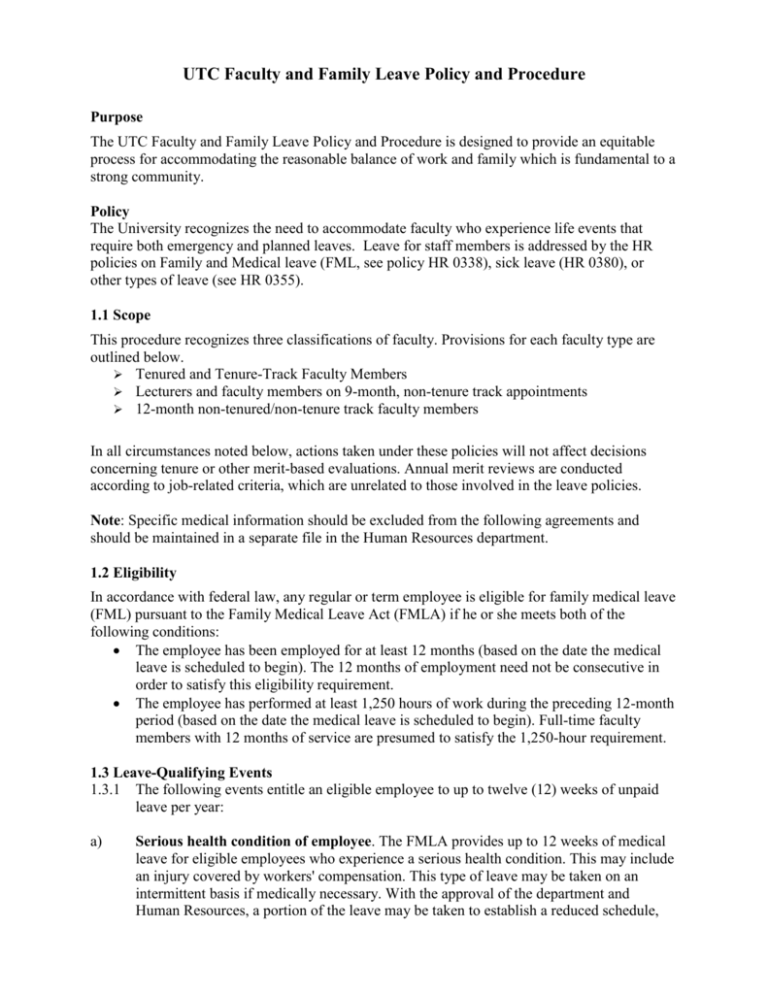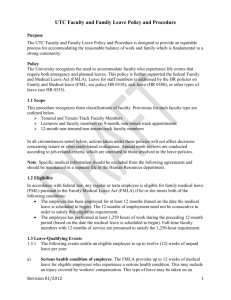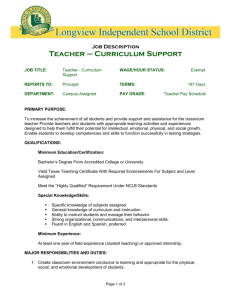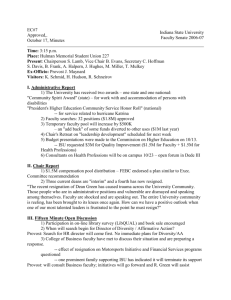UTC Faculty and Family Leave Policy and Procedure
advertisement

UTC Faculty and Family Leave Policy and Procedure Purpose The UTC Faculty and Family Leave Policy and Procedure is designed to provide an equitable process for accommodating the reasonable balance of work and family which is fundamental to a strong community. Policy The University recognizes the need to accommodate faculty who experience life events that require both emergency and planned leaves. Leave for staff members is addressed by the HR policies on Family and Medical leave (FML, see policy HR 0338), sick leave (HR 0380), or other types of leave (see HR 0355). 1.1 Scope This procedure recognizes three classifications of faculty. Provisions for each faculty type are outlined below. Tenured and Tenure-Track Faculty Members Lecturers and faculty members on 9-month, non-tenure track appointments 12-month non-tenured/non-tenure track faculty members In all circumstances noted below, actions taken under these policies will not affect decisions concerning tenure or other merit-based evaluations. Annual merit reviews are conducted according to job-related criteria, which are unrelated to those involved in the leave policies. Note: Specific medical information should be excluded from the following agreements and should be maintained in a separate file in the Human Resources department. 1.2 Eligibility In accordance with federal law, any regular or term employee is eligible for family medical leave (FML) pursuant to the Family Medical Leave Act (FMLA) if he or she meets both of the following conditions: The employee has been employed for at least 12 months (based on the date the medical leave is scheduled to begin). The 12 months of employment need not be consecutive in order to satisfy this eligibility requirement. The employee has performed at least 1,250 hours of work during the preceding 12-month period (based on the date the medical leave is scheduled to begin). Full-time faculty members with 12 months of service are presumed to satisfy the 1,250-hour requirement. 1.3 Leave-Qualifying Events 1.3.1 The following events entitle an eligible employee to up to twelve (12) weeks of unpaid leave per year: a) Serious health condition of employee. The FMLA provides up to 12 weeks of medical leave for eligible employees who experience a serious health condition. This may include an injury covered by workers' compensation. This type of leave may be taken on an intermittent basis if medically necessary. With the approval of the department and Human Resources, a portion of the leave may be taken to establish a reduced schedule, including for the purpose of transitioning back to full-time employment. Medical certification and/or approval may be required. b) Serious health condition of family member. The FMLA provides up to 12 weeks of medical leave for the serious health condition of a spouse, child, or parent. This type of leave can be taken on an intermittent basis if medically necessary. With the approval of the department and Human Resources, a portion of the leave may be taken to establish a reduced schedule, including for the purpose of transitioning back to full-time employment. Medical certification and/or approval may be required. c) Foster care placement. The FMLA provides up to 12 weeks for foster care placement. Leave in advance of the placement of the child can be taken if the leave is necessary for the placement to proceed. Otherwise the leave must be taken within 12 months after foster care placement of the child. With the approval of the department and Human Resources, a portion of the leave may be taken to establish a reduced schedule for the purpose of transitioning back to full-time employment. If both parents work for the university, their combined total of available leave is 12 weeks. d) Qualifying exigency arising out of a family member’s armed service. This type of leave can be taken on an intermittent basis. With the approval of the department and Human Resources, a portion of the leave may be taken to establish a reduced schedule. 1.3.2 The following events entitle an eligible employee to four (4) months of leave: Childbirth and adoption. The Tennessee Maternity Leave Act provides up to four (4) months of leave for pregnancy, childbirth and adoption for full-time employees who have been employed at least twelve (12) consecutive months. In the case of an adoption, leave begins at the time the parents receive custody of the child. This leave runs concurrently with the twelve (12) weeks provided by the FMLA (i.e., eligible employees are entitled to four (4) months total leave). If both husband and wife are employees of the university, their combined total of available leave is four (4) months. With the approval of the department and Human Resources, a portion of the leave may be taken to establish a reduced schedule for the purpose of transitioning back to full-time employment. 1.3.3 The following events entitle an eligible employee to twenty-six (26) weeks of leave: Service member family leave. An eligible employee who is the spouse, child, parent or next of kin of a covered service member shall be entitled to twenty-six (26) weeks of leave in a single 12-month period to care for the service member if he or she suffers a serious injury or illness while in active duty that may render him or her unfit to continue military service. This leave can be taken on an intermittent basis, and a portion of the leave may be taken to establish a reduced schedule. If both spouses are employed by the University, their combined total of available leave is 26 weeks. Upon return from FML the employee will be restored to his or her position or to an equivalent position with equivalent pay, benefits, and other terms and conditions of employment. The twelve-month period during which FML benefits are calculated begins on the first day of the employee’s first FML period for the year. For example, if an employee commences FML on February 1 and exhausts his or her leave, he or she will not be entitled to FML until February 1 of the following year. 2.1 Provisions For Tenured and Tenure-Track Faculty Members The provisions in the section below are intended to provide guidance for tenured or tenure-track faculty members who require work modifications for reasons related to family care-giving responsibilities in accordance with the Faculty Handbook (6.4.2) which states that “certain 9month faculty members may be eligible for certain additional benefits such as modifying service requirements and extending the tenure track probationary status.” Tenured and tenure-track faculty members—whether 9-month or on 12-month assignment—may request a leave of absence without pay or a modified duties assignment with pay. The two options are outlined below. 2.2 Leave of Absence without Pay Tenure-track and tenured faculty members who have a serious illness, or who have primary responsibility for the care of a child or an ill or disabled parent, spouse, or other family member, may request up to 12 weeks of unpaid leave pursuant to the FMLA (see policy HR 0338 and section 1.2 above). Eligibility for fringe benefits during the leave of absence without pay for reasons associated with the faculty member’s serious health condition or for family care reasons shall be governed by the policies applicable to FML without pay (HR 0338) and to other leaves of absence without pay (HR 0355). Faculty members requesting leave of absence without pay should initiate this process by completing the appropriate HR form for FML and submitting it to Human Resources who may require medical certification. Tenure-track and tenured faculty members may take other types of leave without pay pursuant to HR 0355. This leave normally will be approved for no more than one year. The faculty member should request leave without pay in a letter to the Human Resources department. If the request complies with HR 0355, HR will forward the request, without the inclusion of any medical information, to the department head or other administrative officer, who then will forward the request and his/her recommendation to the appropriate dean. The dean will forward the request and his/her recommendation to the Associate Provost who will make the final decision on the request. 2.3 Faculty Modified Duties Assignment (FMDA) Tenure-track and tenured faculty members may request a Faculty Modified Duties Assignment (FMDA) with pay instead of a leave of absence without pay or after an approved leave of absence without pay. This request must be made in writing to the Human Resources department who will send it to the appropriate department head and dean who will forward their recommendation to the Associate Provost for final approval. FMDA will not exceed one year in duration. Modifications in service may include the following: 1. temporarily reduced teaching/service load, or 2. other mutually acceptable arrangement, such as course banking Note: Goals for EDO must be revisited, revised and agreed upon in writing as a result of any approved Modified Duties Assignment. Administrative cooperation in addressing the faculty member’s need for temporary time away from the classroom/service is strongly encouraged. 2.4 FMDA Related to the Arrival of a Child Tenured and tenure-track faculty may modify their responsibilities for up to one semester at full pay while managing the arrival of a child through birth, adoption, or foster care. These modified duties during leave would include: Complete teaching release for one semester Complete release from on-campus scheduled meeting and obligations (although remote attendance may be desirable) Research obligations/opportunities to be negotiated Other desirable and negotiated accommodations The maximum period of modified duties is one semester within 12 months of the child’s arrival (even in the event of multiple birth or placement of multiple children), and modified duties for this purpose may be requested twice in the course of a career. If both parents qualify for a modified duties assignment, they may be required to use it in different semesters, especially if they reside in the same department. Eligibility for fringe benefits during any modification in service shall be determined in accordance with the University Personnel Policy and procedure for each fringe benefit (see policies HR 0355 and HR 0385). 2.5 Extending the Probationary Period A tenure-track faculty member who is granted a leave of absence under the FMLA or the TMLA is eligible for an extension of the tenure-track probationary period for up to one academic year upon agreement by the department head and Dean and with final approval of the Provost. In the event of modified duties and leave due to childbirth, adoption, or commencement of foster care, a one-year extension of the probationary period will be granted. The UT Board of Trustees limits probationary period extensions to a maximum of two years (or two one-year extensions). Requests for an extension of the tenure-track probationary period must be made within one year of the request for a leave of absence, and the request must be made before the tenure review process begins. The Provost may waive these time requirements for what he/she deems to be good cause shown in a written statement by the faculty member. The faculty member must submit a written request for the extension to the department head or other administrative officer, who then will forward the request and his/her recommendation to the appropriate dean. The dean will forward the request and his/her recommendation to the Provost, who will make the final decision on the request. Tenure-track faculty members who are granted an extension of the probationary period will continue to receive annual merit reviews in a process that is independent of the request for extension. Except in the cases where an extension has been granted, the probationary period at UTC shall not exceed seven years. 3.1 Provisions for Lecturers & Faculty Members on 9-month, Non-Tenure Track Appointments Lecturers and faculty members on 9-month, non-tenure track appointments may request a Leave of Absence without Pay or a Modified Duties Assignment with Pay, assuming the faculty member has banked course time. The two options are outlined below. While there is no guarantee of contract renewal each year, every effort will be made to renew non-tenure track faculty in good standing. Leaves, for whatever reason, will not be used as a cause for termination or for non-renewal. 3.2 Leave of Absence without Pay Lecturers and faculty members on 9-month, non-tenure track appointments who have a serious illness, or who have primary responsibility for the care of a child or an ill or disabled parent, spouse, or other family member, may request up to 12 weeks of unpaid leave pursuant to Family and Medical leave (see policy HR 0338). Eligibility for fringe benefits during the leave of absence without pay for reasons associated with the faculty member’s serious health condition or for family care reasons shall be governed by the policies applicable to FML without pay (HR 0338) and to other leaves of absence without pay (HR 0355). Faculty members requesting leave of absence without pay should initiate this process by completing the appropriate HR form for Family and Medical Leave and submitting it to Human Resources who may require medical certification. Lecturers and faculty members on 9-month, non-tenure track appointments may take other types of leave without pay pursuant to HR 0355. This leave normally will be approved for no more than one year. The faculty member should request leave without pay in a letter to the Human Resources department. If the request complies with HR 0355, HR will forward the request— without the inclusion of any medical information—to the department head or other administrative officer, who then will forward the request and his/her recommendation to the appropriate dean. The dean will forward the request and his/her recommendation to the Associate Provost who will make the final decision on the request. 3.3 Faculty Modified Duties Assignment (FMDA) Lecturers and faculty members on 9-month, non-tenure track appointments may request a FMDA with pay instead of a leave of absence without pay or after an approved leave of absence without pay. This request must be made in writing to the Human Resources department who will send it to the appropriate department head and dean who will forward their recommendation to the Associate Provost for final approval. Modified duties assignments will not exceed one year in duration. Modifications in service may include the following: 1. temporarily reduced teaching/service load, or 2. other mutually acceptable arrangement, such as course banking Note: Goals for EDO must be revisited, revised and agreed upon in writing as a result of any approved Modified Duties Assignment. Administrative cooperation in addressing the faculty member’s need for temporary time away from the classroom/service is strongly encouraged. 3.4 FMDA Related to the Arrival of a Child Tenured and tenure-track faculty may modify their responsibilities for up to one semester at full pay while managing the arrival of a child through birth, adoption, or foster care. These modified duties during leave would include: Complete teaching release for one semester Complete release from on-campus scheduled meeting and obligations (although remote attendance may be desirable) Research obligations/opportunities to be negotiated Other desirable and negotiated accommodations The maximum period of modified duties is one semester within 12 months of the child’s arrival (even in the event of multiple birth or placement of multiple children), and modified duties for this purpose may be requested twice in the course of a career. If both parents qualify for a modified duties assignment, they may be required to use it in different semesters, especially if they reside in the same department. Eligibility for fringe benefits during any modification in service shall be determined in accordance with the University Personnel Policy and procedure for each fringe benefit (see policies HR 0355 and HR 0385). 4.1 Provisions for 12-month Non-Tenured/Non-Tenure Track Faculty Members Leave policies for 12-month non-tenured/non-tenure track faculty members are addressed by the HR policies on Family and Medical leave (see policy HR 0338), sick leave (HR 0380), or other types of leave (see HR 0355). Additional information may be found in the UTC Faculty Handbook. These faculty members should see the Human Resources web site for details and procedures pertaining to this policy. 5.1 Extended Emergency Medical Leave In the event that a regular, full-time faculty member of any classification or a qualifying dependent experiences an unplanned, unanticipated long-term emergency medical leave (e.g., heart attack, stroke, vehicular accident, etc.) the faculty member will continue to receive his or her salary and benefits through the end of the semester in which the leave occurred. A faculty member must inform the appropriate department head of the emergency leave as soon as practically possible but no later than six (6) days from the emergency event. If the condition that resulted in the emergency medical leave continues into the following semester, the faculty member must follow the procedure for requesting a leave of absence without pay, request a FMDA with pay or may use “banked” courses to continue pay. The decision to continue to provide a faculty member with full pay during the following semester will be at the discretion of the Dean of the appropriate college. Such decisions will be reported to the Associate Provost and to the Director of Human Resources. A tenure-track faculty member who must take an extended emergency leave of absence is eligible for an extension of the tenure-track probationary period for up to one academic year upon agreement by the department head and Dean and with final approval of the Provost. (Please refer to Section 2.5.) Requests for an extension of the tenure-track probationary period must be made within one year of the start of the leave, and the request must be made before the tenure review process begins. Review of UTC Faculty and Family Leave Policy The Provost and Vice Chancellor for Academic Affairs will be responsible for the review and update of this policy at least every three years. Authorization _____________________________________ Responsible Administrator _____________________________ Chair, Policy Review Committee _____________________________________ Office of General Counsel ______________________________ Chancellor 4851-4732-1866, v. 1




